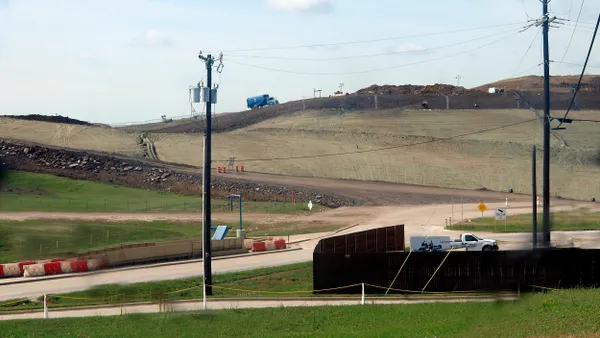Dive Brief:
- Republic Services (via a subsidiary) has announced plans to sue two more companies in an effort to bring others to "the table" over remediation costs at the West Lake Landfill Superfund site, according to the Saint Louis Post-Dispatch and a lawsuit in U.S. District Court for the Eastern District of Missouri.
- Republic has now set its sights on Citigroup because it is believed to own a subsidiary which controls the assets of Commercial Discount Corporation, a company that "owned and arranged for the disposal of hazardous substances that ended up in West Lake Landfill in 1973."
- Republic also recently sued EverZinc LLC – a company formerly known as African Metals – which previously sold uranium ore and ore concentrates that were used during WWII by the U.S. government. Republic says the company also disposed of some radioactive material from the war at West Lake.
Dive Insight:
Republic, through subsidiary Bridgeton Landfill LLC, is fighting on multiple fronts to reduce the cost burden of a recently announced EPA cleanup plan that it has opposed. The company assumed ownership of West Lake, and the adjacent Bridgeton Landfill, in the 2008 Allied Waste merger.
After years of discussion, the agency recently came out in favor of removing the contaminated radioactive material for an estimated price tag of $205 million. This entails excavating 8-20 feet deep, shipping material off to licensed facilities via rail and then backfilling the site. Republic says this creates unnecessary risk and will take too long, advocating instead for covering the site.
Last month, Republic also sued Mallinckrodt LLC, a pharmaceutical company, in an attempt to get the firm to contribute financially. Mallinckrodt was previously Mallinckrodt Chemical Works, which disposed residue from uranium refining at the site.
The three potentially responsible parties (PRPs) that must pay for remediation of the site – Republic, Exelon Corp. and the U.S. Department of Energy – had agreed on splitting the estimated $75 million cost of a capping plan. That was significantly cheaper and faster than EPA's new estimate. No such agreement has been reached about how to split the costs of this new plan, and the EPA currently plans to leave that up to the three PRPs.
The situation is growing more complicated, unveiling the challenges inherent for regulatory agencies or corporations seeking to track down and hold accountable companies that may no longer exist, or have been bought up. Even when they're at the table, as Republic is, questions about equitably sharing the financial burden still remain.









